First comes love, then comes marriage, then comes baby in a baby carriage.”
For many couples, this old school rhyme is still the trajectory life follows. Sometimes the order is different – the baby comes first, there might be a house purchase along the way or a few years living abroad but for many, these are rites of passage to be celebrated.
Ranae Von Meding presumed her life would follow that same course, until her 21st birthday when she realised she had feelings for her friend Audrey Rooney.
“Audrey and I were an unlikely friendship,” Ranae says laughing. “We met at drama college. I was a young over-enthusiastic American and she was seven years older and more of an introvert. We were close friends before we realised there was an attraction.”
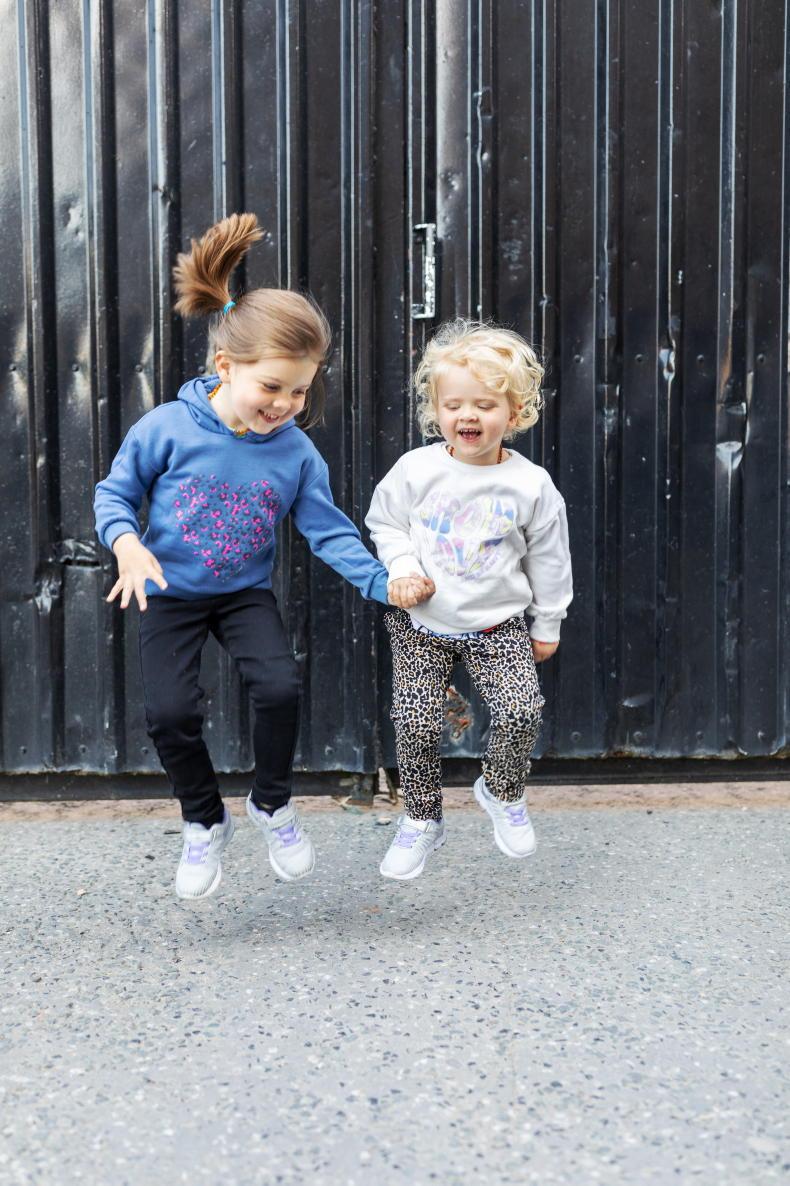
\ Claire Nash
This came as a massive surprise to Ranae. “My family moved from America to Ireland when I was four and I grew up in an ultra-religious and conservative household. I was brought up being told that being gay was one of the worst things a person could be. As I got older, some of my friends were gay so I started questioning that upbringing. These were amazing people so who cares who they love?
“But I never thought about it for myself. I presumed I would meet a nice Christian man, get married and have children. That was, until I met Audrey.”
When Ranae and Audrey finally revealed their relationship, it didn’t go down well.
“Audrey’s family were of the opinion that if she was happy, they were happy. But in my family, it was difficult. There was a lot of tears and pleading not to be in this relationship.
“Audrey and I are together 14 years now and there were certainly some tough years along the way. A lot of boundaries had to be put in place and a lot of therapy.
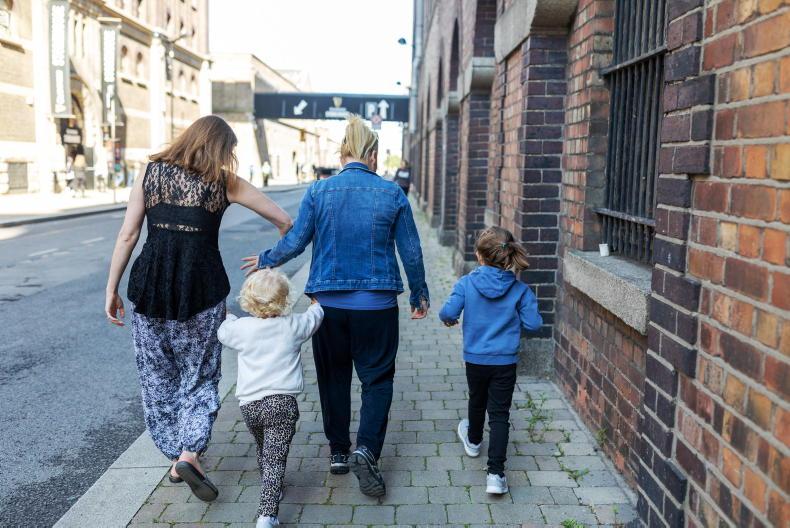
\ Claire Nash
“Thankfully, things are a lot better now. I think having kids has really changed things. When someone sees their grandkids, it’s hard to deny that connection, that sense of love and family. My mother is now our number one babysitter.”
While Ranae and Audrey were aware of the family challenges they may face, they were oblivious to other challenges in their path. There were some happy surprises however.
“When we first got together, we didn’t think it would be possible to get married but as momentum built coming up to the marriage referendum, we began to realise that this may be a possibility. It was amazing when it passed.”
At that stage, the couple had already started planning children.

\ Claire Nash
“We were certain from early in our relationship that we wanted children. Audrey is one of eight, I’m one of four and we have lots of nieces and nephews, we’re just the kind of people who love kids.”
Different options on how to conceive were considered until Ranae and Audrey came across the term ‘Reciprocal IVF’.
“This means that one female partner donates their eggs and the other female partner carries the child,” explains Ranae.
“For us, it was the natural choice and there was no argument on the role each of us would play. I always wanted to carry a child, to experience the magic of pregnancy, to birth a baby. Audrey didn’t have that want but by donating her eggs, she would have that biological connection to our children.”
So in 2015, Ranae and Audrey were ready to start their family but the excitement was shortlived.
“We contacted a well-known IVF clinic but immediately were told that although they would love to help us, they couldn’t. It was a licensing issue, there was no clinics in Ireland that had the licence to do this form of IVF.”

\ Claire Nash
“It was very disappointing. The marriage referendum was in full swing at the time, equality for the gay community was being celebrated but, yet, this form of conception couldn’t be done in Ireland. As many people know, the IVF process is quite intense and having to travel to another country adds to the stress of the situation. But we were determined and were facilitated in a clinic in Barcelona.”
Happily, Ranae became pregnant and when she was five months along, shortly after the referendum, Ranae and Audrey stood in front of their family and became a married couple. But, again, their happiness was shortlived.
“There we were, newly married and pregnant, delighted and excited about life when a few hard truths came to light. Although we were a married couple and the baby had Audrey’s genetics, we would not be seen as equal parents in the eyes of the law. In fact, Audrey’s name couldn’t be on the birth cert.”
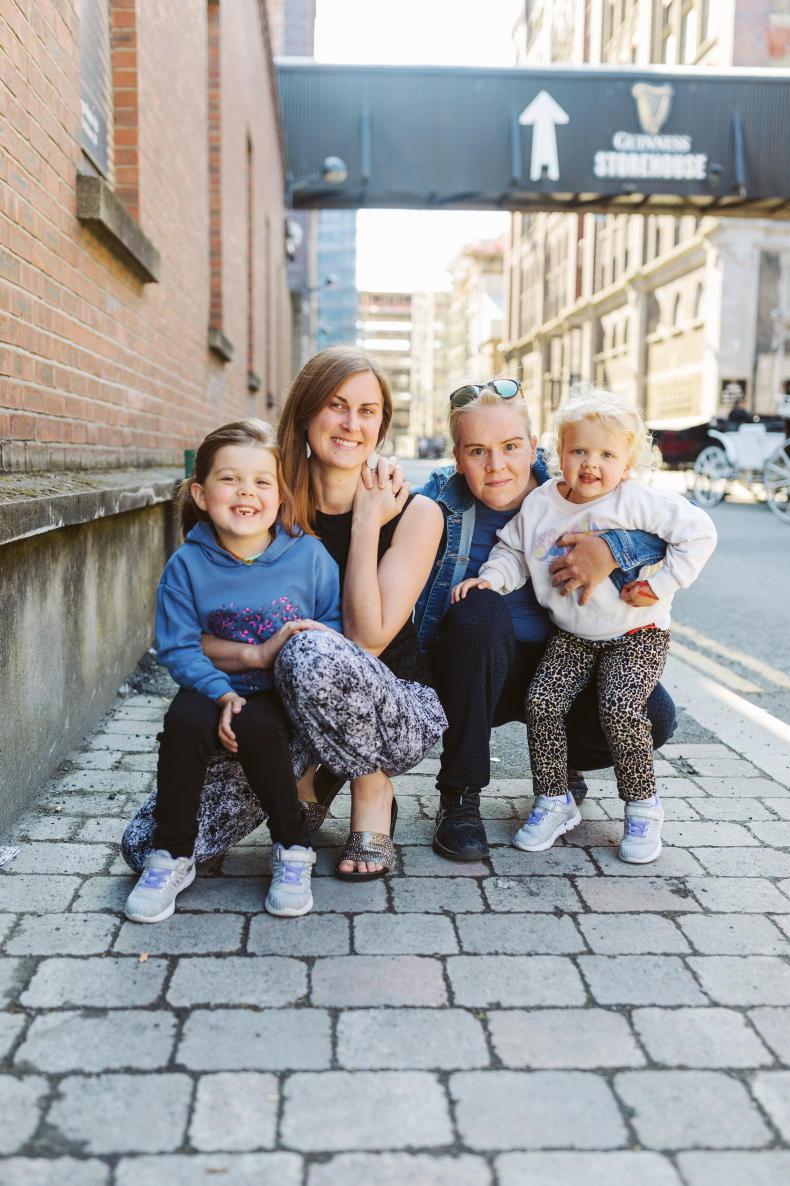
\ Claire Nash
This isn’t just about paperwork, the reality of the situation has affected the family since the day their daughter Ava (six) was born.
Ranae says: “I’ll never forget registering her birth. It was the first glimpse into the reality of the situation. We went into the registrar’s office and the registrar looked at both of us and said, “Which one of you is the mother?” We said, we both are. “No, I mean who gave birth?” she asked.
As soon as I answered that I had, she said, “Ranae, I am going to direct all my questions to you now.”
From that moment, she didn’t look at Audrey, she didn’t even acknowledge that my wife was present. My name was put on the birth cert as her mother and beside it was a blank space. It was humiliating.”
And this was just the beginning.
“I was forced to do stuff, that if my spouse was a man, I wouldn’t have to do. In order to get a passport for Ava, I had to declare I was a single parent. I have to go to a solicitor and sign an affidavit stating I had no partner even though my loving wife was at home with our child.
“I had to get guards to witness legal documents that were not true, jump through hoops that other parents are not expected to do. Getting vaccines, COVID-19 tests, registering for school –anything that needed parental permission, every single one of them fell to me. So not only did it create an imbalance in our family where all the pressure was put on me, it also created guilt because I had all this power.
“Not that I would ever think of taking our daughter away from Audrey but legally, I could have done so very easily. In the eyes of the law, Audrey was a legal stranger to Ava.
“We felt anger, devastation, humiliation, the whole thing was just so unjust.”
Ranae started speaking out about the issue. “I was on television, doing radio interviews and pieces for the papers. But when our second daughter Arya was born in 2018, and we had to go through it all again, that put fire in my belly to speak out more.
“I remember going on Ireland AM on Virgin Media Television when Arya was just two weeks old. I had a new born, two blood transfusions and I looked a wreck but I was so eager to raise awareness.
That year, in 2019, Equality for Children was formed. Ranae says: “It was a coming together of families, inspired by other grassroot groups that had influenced legislation and we were determined to do the same.”
Because there was one piece of legislation that had to be pushed forward. Ranae explains: “The Children and Family Relationship Act is a piece of legislation that was passed before marriage equality but it never commenced. It had been written but not enacted so essentially, it was useless.
“We were determined to improve elements of the original bill and push it forward. Essentially, the legislation created a framework whereby there would be a donor database in Ireland. So when a child is conceived through a donor, that donor would be identifiable.
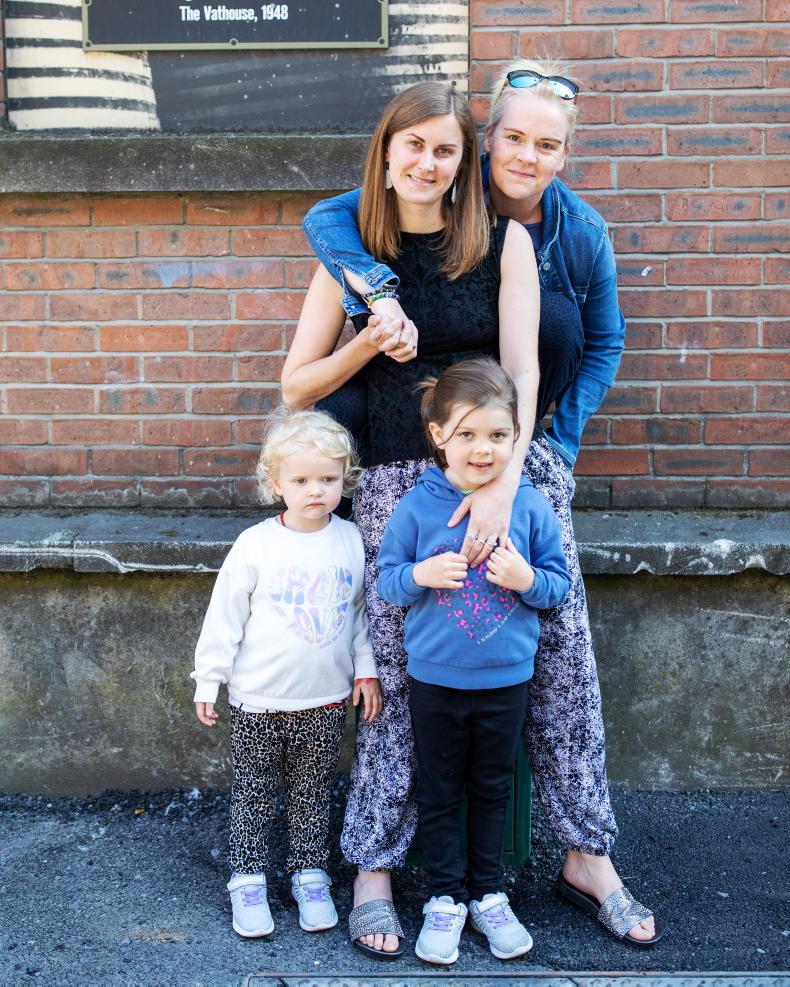
\ Claire Nash
“It also allowed for the child’s parents to be named on the birth cert if the child was conceived in a way that was set out in the act.
“Importantly, for us, one of the criteria was if you conceived and gave birth to your child before the law was enacted, there were some amnesties. For a female couple, as long as you used a fertility clinic and a donor (whether at home or abroad), and gave birth in Ireland, you were covered.”
After five long years of delays, the Children and Family Relationship Act 2015 commenced on 4 May 2020.
“Our court date eventually arrived in October 2021, to get our declaration of parentage for Audrey. We were so relieved for our family and now, finally, both myself and Audrey’s names proudly sit on Ava and Arya’s birth certificates. In the eyes of the law, we are finally seen as equal parents.”
However, as joyous as the occasion was for the couple, this piece of legislation is still considered extremely restrictive and does not include many other different types of families in Ireland.
“Ava and Arya were only included retrospectively under this legislation. This means that if Audrey and I decide to grow our family in the future, and use the frozen embryos that we have abroad, that child would not be included because we are using a foreign clinic. We would be back to where we were previously.
“But it’s not just us. Going forward, the only people who are protected in the LGBTQ+ community when it comes to having a child are some same-sex female couples. They must use an Irish fertility clinic, an identifiable donor and the child must be born in Ireland. If you don’t meet that criteria, your children are left in a legal limbo.
We are fighting for all those children, all those parents and all those families
“This excludes a huge number of people including anyone who used a clinic outside of Ireland, anyone who chooses not to use a clinic, anyone who is Irish but gives birth to their baby in another country.
“Significantly, it excludes parents who conceive through surrogacy, whether that’s same sex couples or heterosexual couples. So we are working very closely with other organisations to rectify this.
“We are fighting for all those children, all those parents and all those families. We have to remember that assisted human reproduction and surrogacy have been around for decades now. There are adults that were conceived through surrogacy, 20 or 25 years ago who have been denied the right to be legally connected to their parents.
“We want to see an Ireland in which no child is discriminated against because of the method in which they were conceived or born, or the sex of their parents. Children should have the right to be legally connected to both of their parents. We fought so hard for marriage equality, now we’re still fighting for equality for our children.”
*Reciprocal IVF is now available for same-sex couples in Irish IVF clinics
First comes love, then comes marriage, then comes baby in a baby carriage.”
For many couples, this old school rhyme is still the trajectory life follows. Sometimes the order is different – the baby comes first, there might be a house purchase along the way or a few years living abroad but for many, these are rites of passage to be celebrated.
Ranae Von Meding presumed her life would follow that same course, until her 21st birthday when she realised she had feelings for her friend Audrey Rooney.
“Audrey and I were an unlikely friendship,” Ranae says laughing. “We met at drama college. I was a young over-enthusiastic American and she was seven years older and more of an introvert. We were close friends before we realised there was an attraction.”

\ Claire Nash
This came as a massive surprise to Ranae. “My family moved from America to Ireland when I was four and I grew up in an ultra-religious and conservative household. I was brought up being told that being gay was one of the worst things a person could be. As I got older, some of my friends were gay so I started questioning that upbringing. These were amazing people so who cares who they love?
“But I never thought about it for myself. I presumed I would meet a nice Christian man, get married and have children. That was, until I met Audrey.”
When Ranae and Audrey finally revealed their relationship, it didn’t go down well.
“Audrey’s family were of the opinion that if she was happy, they were happy. But in my family, it was difficult. There was a lot of tears and pleading not to be in this relationship.
“Audrey and I are together 14 years now and there were certainly some tough years along the way. A lot of boundaries had to be put in place and a lot of therapy.

\ Claire Nash
“Thankfully, things are a lot better now. I think having kids has really changed things. When someone sees their grandkids, it’s hard to deny that connection, that sense of love and family. My mother is now our number one babysitter.”
While Ranae and Audrey were aware of the family challenges they may face, they were oblivious to other challenges in their path. There were some happy surprises however.
“When we first got together, we didn’t think it would be possible to get married but as momentum built coming up to the marriage referendum, we began to realise that this may be a possibility. It was amazing when it passed.”
At that stage, the couple had already started planning children.

\ Claire Nash
“We were certain from early in our relationship that we wanted children. Audrey is one of eight, I’m one of four and we have lots of nieces and nephews, we’re just the kind of people who love kids.”
Different options on how to conceive were considered until Ranae and Audrey came across the term ‘Reciprocal IVF’.
“This means that one female partner donates their eggs and the other female partner carries the child,” explains Ranae.
“For us, it was the natural choice and there was no argument on the role each of us would play. I always wanted to carry a child, to experience the magic of pregnancy, to birth a baby. Audrey didn’t have that want but by donating her eggs, she would have that biological connection to our children.”
So in 2015, Ranae and Audrey were ready to start their family but the excitement was shortlived.
“We contacted a well-known IVF clinic but immediately were told that although they would love to help us, they couldn’t. It was a licensing issue, there was no clinics in Ireland that had the licence to do this form of IVF.”

\ Claire Nash
“It was very disappointing. The marriage referendum was in full swing at the time, equality for the gay community was being celebrated but, yet, this form of conception couldn’t be done in Ireland. As many people know, the IVF process is quite intense and having to travel to another country adds to the stress of the situation. But we were determined and were facilitated in a clinic in Barcelona.”
Happily, Ranae became pregnant and when she was five months along, shortly after the referendum, Ranae and Audrey stood in front of their family and became a married couple. But, again, their happiness was shortlived.
“There we were, newly married and pregnant, delighted and excited about life when a few hard truths came to light. Although we were a married couple and the baby had Audrey’s genetics, we would not be seen as equal parents in the eyes of the law. In fact, Audrey’s name couldn’t be on the birth cert.”

\ Claire Nash
This isn’t just about paperwork, the reality of the situation has affected the family since the day their daughter Ava (six) was born.
Ranae says: “I’ll never forget registering her birth. It was the first glimpse into the reality of the situation. We went into the registrar’s office and the registrar looked at both of us and said, “Which one of you is the mother?” We said, we both are. “No, I mean who gave birth?” she asked.
As soon as I answered that I had, she said, “Ranae, I am going to direct all my questions to you now.”
From that moment, she didn’t look at Audrey, she didn’t even acknowledge that my wife was present. My name was put on the birth cert as her mother and beside it was a blank space. It was humiliating.”
And this was just the beginning.
“I was forced to do stuff, that if my spouse was a man, I wouldn’t have to do. In order to get a passport for Ava, I had to declare I was a single parent. I have to go to a solicitor and sign an affidavit stating I had no partner even though my loving wife was at home with our child.
“I had to get guards to witness legal documents that were not true, jump through hoops that other parents are not expected to do. Getting vaccines, COVID-19 tests, registering for school –anything that needed parental permission, every single one of them fell to me. So not only did it create an imbalance in our family where all the pressure was put on me, it also created guilt because I had all this power.
“Not that I would ever think of taking our daughter away from Audrey but legally, I could have done so very easily. In the eyes of the law, Audrey was a legal stranger to Ava.
“We felt anger, devastation, humiliation, the whole thing was just so unjust.”
Ranae started speaking out about the issue. “I was on television, doing radio interviews and pieces for the papers. But when our second daughter Arya was born in 2018, and we had to go through it all again, that put fire in my belly to speak out more.
“I remember going on Ireland AM on Virgin Media Television when Arya was just two weeks old. I had a new born, two blood transfusions and I looked a wreck but I was so eager to raise awareness.
That year, in 2019, Equality for Children was formed. Ranae says: “It was a coming together of families, inspired by other grassroot groups that had influenced legislation and we were determined to do the same.”
Because there was one piece of legislation that had to be pushed forward. Ranae explains: “The Children and Family Relationship Act is a piece of legislation that was passed before marriage equality but it never commenced. It had been written but not enacted so essentially, it was useless.
“We were determined to improve elements of the original bill and push it forward. Essentially, the legislation created a framework whereby there would be a donor database in Ireland. So when a child is conceived through a donor, that donor would be identifiable.

\ Claire Nash
“It also allowed for the child’s parents to be named on the birth cert if the child was conceived in a way that was set out in the act.
“Importantly, for us, one of the criteria was if you conceived and gave birth to your child before the law was enacted, there were some amnesties. For a female couple, as long as you used a fertility clinic and a donor (whether at home or abroad), and gave birth in Ireland, you were covered.”
After five long years of delays, the Children and Family Relationship Act 2015 commenced on 4 May 2020.
“Our court date eventually arrived in October 2021, to get our declaration of parentage for Audrey. We were so relieved for our family and now, finally, both myself and Audrey’s names proudly sit on Ava and Arya’s birth certificates. In the eyes of the law, we are finally seen as equal parents.”
However, as joyous as the occasion was for the couple, this piece of legislation is still considered extremely restrictive and does not include many other different types of families in Ireland.
“Ava and Arya were only included retrospectively under this legislation. This means that if Audrey and I decide to grow our family in the future, and use the frozen embryos that we have abroad, that child would not be included because we are using a foreign clinic. We would be back to where we were previously.
“But it’s not just us. Going forward, the only people who are protected in the LGBTQ+ community when it comes to having a child are some same-sex female couples. They must use an Irish fertility clinic, an identifiable donor and the child must be born in Ireland. If you don’t meet that criteria, your children are left in a legal limbo.
We are fighting for all those children, all those parents and all those families
“This excludes a huge number of people including anyone who used a clinic outside of Ireland, anyone who chooses not to use a clinic, anyone who is Irish but gives birth to their baby in another country.
“Significantly, it excludes parents who conceive through surrogacy, whether that’s same sex couples or heterosexual couples. So we are working very closely with other organisations to rectify this.
“We are fighting for all those children, all those parents and all those families. We have to remember that assisted human reproduction and surrogacy have been around for decades now. There are adults that were conceived through surrogacy, 20 or 25 years ago who have been denied the right to be legally connected to their parents.
“We want to see an Ireland in which no child is discriminated against because of the method in which they were conceived or born, or the sex of their parents. Children should have the right to be legally connected to both of their parents. We fought so hard for marriage equality, now we’re still fighting for equality for our children.”
*Reciprocal IVF is now available for same-sex couples in Irish IVF clinics










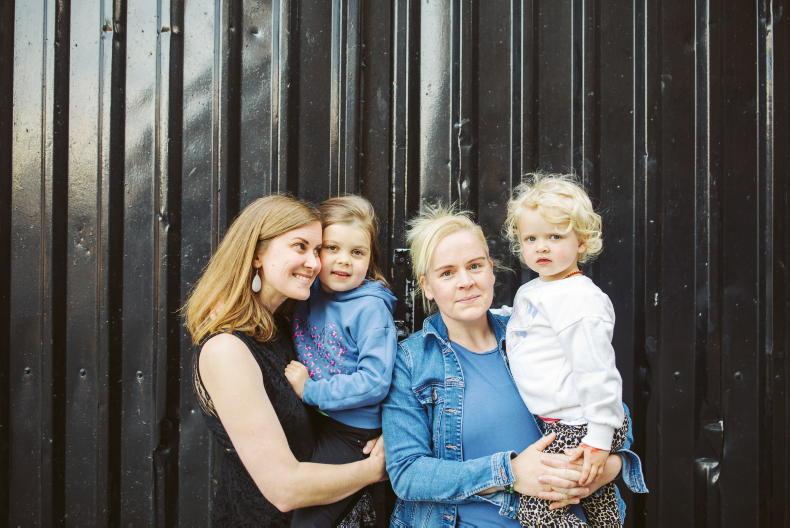
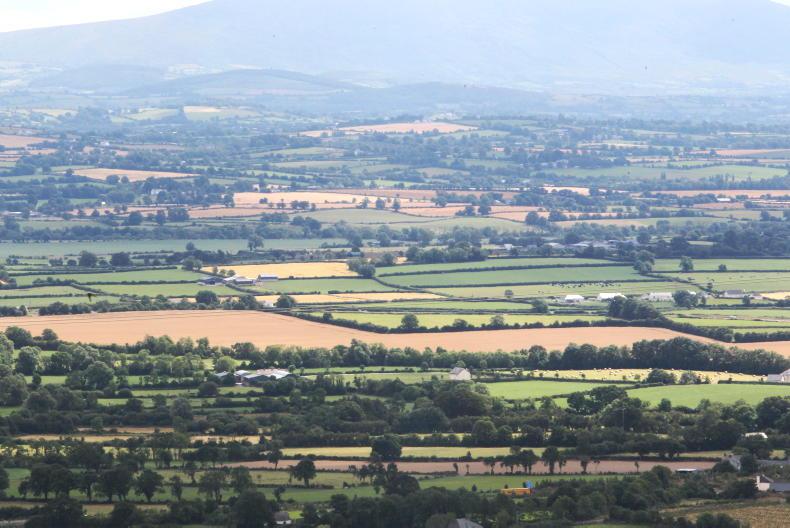
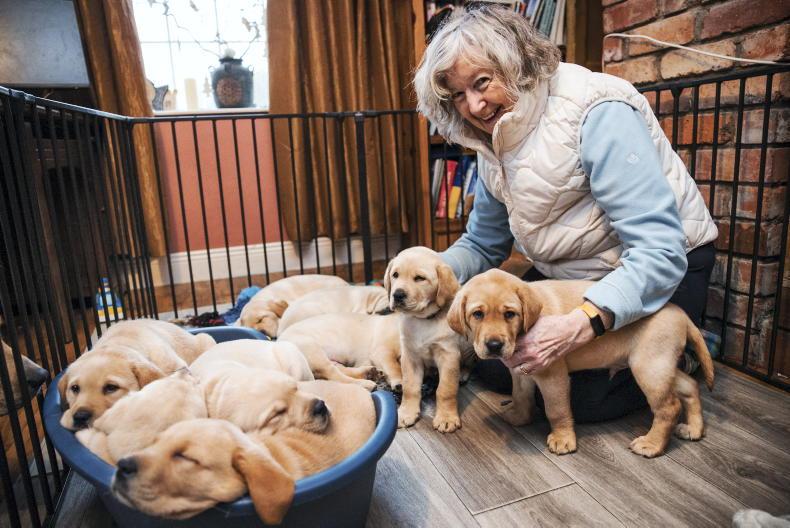
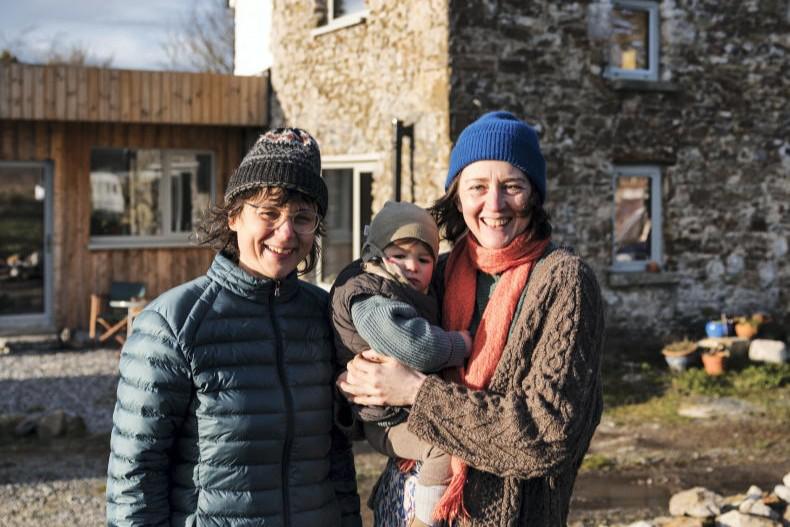
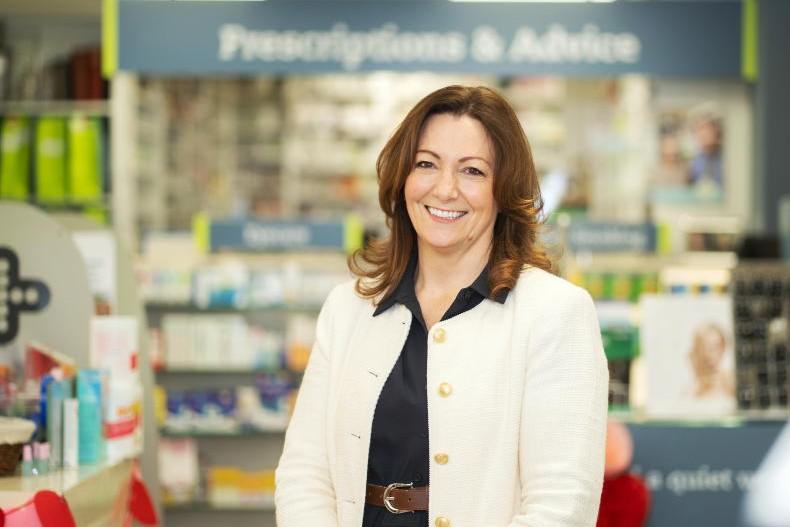
SHARING OPTIONS